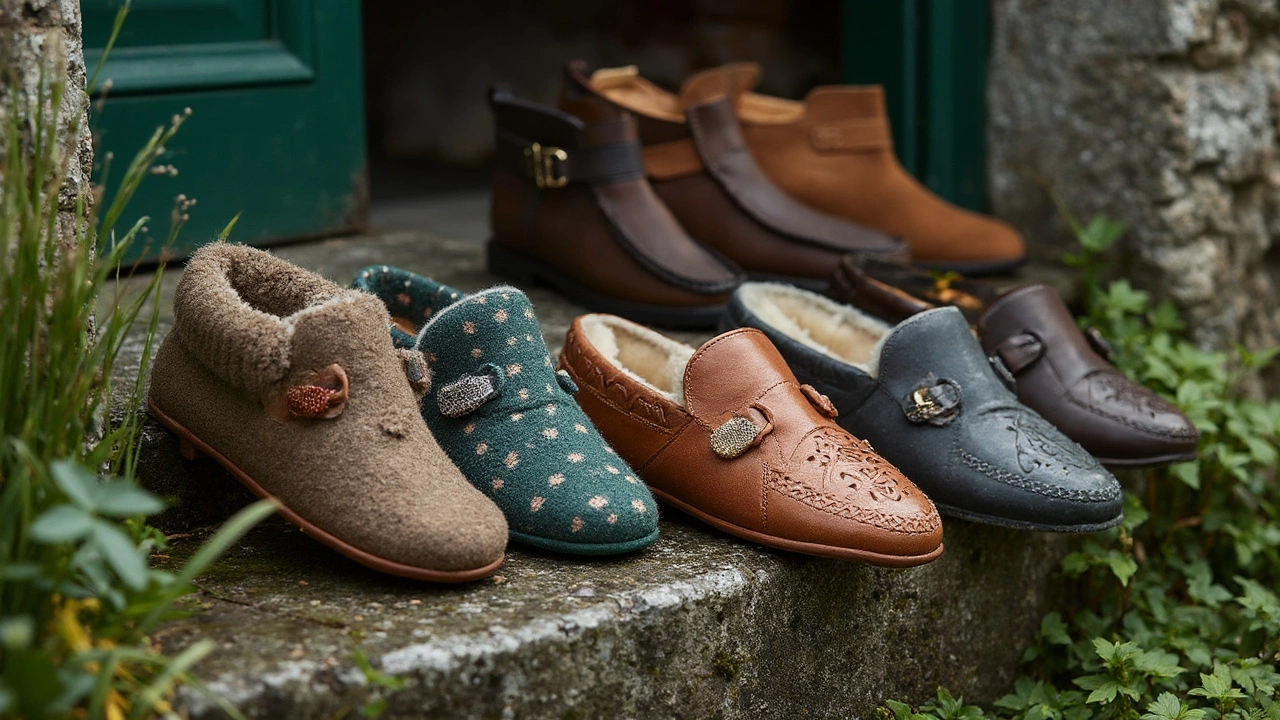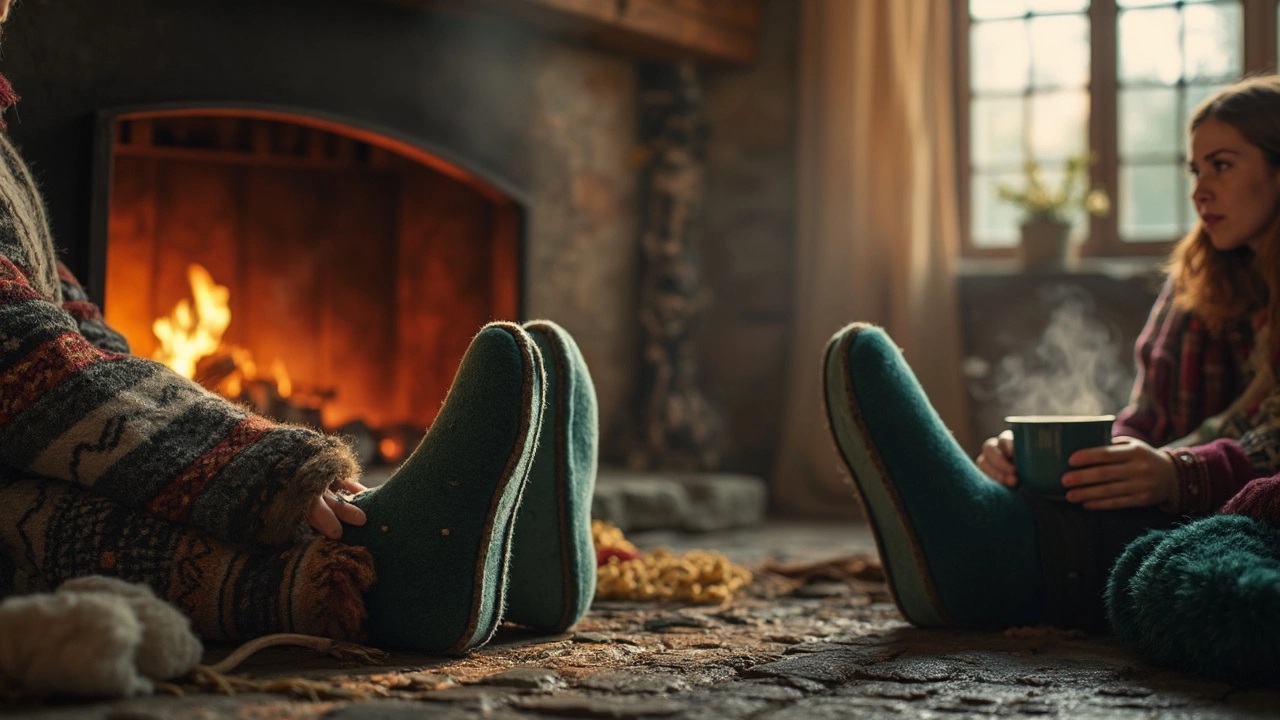If you live in Ireland, or even stay for a while, you learn quickly: a good pair of slippers can save your day. Irish homes, whether it’s a red-brick in Drumcondra or a cottage in West Cork, have floors that get cold. That chill from the stone tiles or hardwood isn’t something to brush off—especially when winter seems to last half the year.
So, how do you actually pick slippers that make sense here? It’s not just about grabbing anything fluffy. Think about how often rain sneaks into the hallway or how draughty some older houses can be. Warmth and grip really matter in Ireland, maybe more than anywhere else. The right slippers feel cosy but also stop you from taking a slide across the kitchen on a wet morning.
People in Ireland also love a blend of tradition and comfort. The Aran Islands, famous for their chunky knit jumpers, have inspired some lovely hand-knit slipper designs you’ll spot at markets like the one in Galway. Your choice comes down to more than just looks: it’s really about fitting your lifestyle, your home, and the unpredictable Irish weather.
- Why the Right Slippers Matter in Ireland
- Materials and Warmth: What Works for Irish Homes
- Finding the Perfect Fit and Support
- Where to Buy: Irish Brands and Local Stores
Why the Right Slippers Matter in Ireland
Slippers are a bit of a non-negotiable in Ireland. Anyone who’s stepped onto a stone floor in January knows how cold it gets. Our winters are damp, and even in summer, a sudden downpour isn’t rare, so drafty rooms and chilly floors are pretty much the standard in many homes. That means a decent pair of slippers is more essential here than in warmer places.
It’s not just about comfort. A lot of Irish homes—especially older ones—are known for their cool interiors thanks to big windows, tile or concrete floors, and less insulation compared to newer builds. Central heating isn’t always running all day, given how expensive electricity and heating oil can be. Wearing slippers helps you stay warm without blasting the radiators constantly, which is better for your bills and the environment.
If you visit friends or family, you might even spot a basket of slippers by the door. It’s not unusual for hosts to offer guests a pair, especially during the colder months. In rural areas, it keeps outdoor muck from sheep fields or bogs at the door, and in cities, it just makes things a bit cosier when shoes come off at the hallway mat.
Another important thing: safety. Wet socks on tile aren’t just uncomfortable—they’re slippery and can lead to falls, especially for kids or older relatives. Grippy soles become a must after you’ve had one too many near-misses in the kitchen.
And don’t forget tradition. It’s pretty common to see hand-knit slippers at Christmas markets like the ones in Dublin, or find GAA-branded slippers for sale in county shops. Picking out slippers Ireland style is almost as much about showing off a bit of your home county pride as keeping your toes warm. So in Ireland, slippers aren’t just an afterthought—they’re part of the daily routine.
Materials and Warmth: What Works for Irish Homes
Irish homes tend to get properly chilly—especially in winter when damp air seems to sneak into every corner. That’s why picking the right materials for your slippers matters. It’s not just about comfort, but about keeping your toes warm and dry—and making sure your slippers last more than one season.
Wool is a bit of a hero here. It’s not just warm—even when it gets damp, it still insulates. That’s why so many Irish brands, from Foxford to Aran Crafts, offer slippers made with wool felt or thick knit. These are perfect if you’re dealing with traditional stone or tile floors, since they trap heat really well.
If you’re looking for something easy to clean, synthetic fleece can be handy, though it doesn’t always last as long as natural materials. Leather slippers are popular too, especially moccasin styles. They’re great if you want something harder-wearing for popping outside to bring in the post or bins. Just check they have a good rubber sole—a lot of people slip if they go for the soft-suede options.
Here’s a quick run-down of the main materials and what works for the Irish climate:
- Wool: Warm, breathable, and keeps insulating even if it’s a bit damp.
- Sheepskin: Cosy and insulating, but best for the colder months. Brands like Slipper Genie use proper Irish sheepskin.
- Fleece: Cheap and cheerful, easy to care for, but not as breathable as wool.
- Leather: Tough and handles a bit of water, but can feel cool at first unless it’s lined with shearling or wool.
If you’re living in a newer house with modern heating, you might get away with lighter slippers. But for older houses or ground floors, never underestimate good insulation!
Here’s a quick look at how different slipper materials stack up for warmth and durability in Ireland:
| Material | Warmth | Durability | Best For |
|---|---|---|---|
| Wool | High | Good | Cold, damp floors |
| Sheepskin | Very High | Excellent | Winter, older homes |
| Fleece | Medium | OK | Warmer or modern homes |
| Leather (lined) | Medium-High | Very Good | Inside & limited outdoor use |
If allergies are a worry, check labels—sometimes wool blends include synthetic fibres. And for sustainable shoppers, lots of Irish makers use local wool or recycled materials, so you can keep your feet and your conscience warm.

Finding the Perfect Fit and Support
Here’s the thing: comfy slippers only matter if they actually fit your feet well. Loads of people in Ireland just buy by size and hope for the best, but it pays to check a few details before you buy—especially if you’re wearing them every day on chilly floors. A loose slipper may drag and trip you up, while something too tight cuts off your circulation. Half-sizes are rare for slippers, but don’t settle for a tight pair thinking they’ll stretch enough. If you’re shopping in-person, always try both slippers on and take a quick walk around the store. Don’t forget, your feet swell a little by the evening!
Support matters too. Plenty of old houses in Irish towns have floors with little give, so look for slippers with some sort of cushioned insole. This makes a real difference if you’re wandering between the kitchen, utility, and upstairs. If you have any issues with your arches or plantar fasciitis, you’ll feel the benefit straight away—brands like Shoezone and even Dunnes have lines with memory foam that help out a surprising amount for the price. Hard, smooth soles are ideal for nipping outside to the bin or the line, especially during drizzly mornings.
- Check for a snug but not tight fit—your heel should stay in place with no flopping.
- Look for soft padding or memory foam if you’ll be wearing them for long stretches.
- Try slippers on with socks, especially thick wool ones in winter.
- Go for hard-soled options if your walks to the shed get wet or mucky.
If you’re buying for someone with special foot needs—maybe for a grandparent or anyone with diabetes—double check the inside seams for rough bits that could cause blisters. There are even Irish shops specializing in wide or extra-deep options, like Greenes Shoes or online sellers who deliver across the country.
| Brand/Store | Fit Options | Special Features |
|---|---|---|
| Slippers Ireland | Range of sizes, some wide-fit | Memory foam, hard soles |
| Dunnes Stores | Standard and wide, half sizes sometimes | Budget-friendly, machine washable |
| Arnotts Dublin | Regular and premium fit | Leather soles, premium materials |
| Greenes Shoes | Wide fit/extra deep | Orthopaedic support, soft seams |
That bit of effort up front is worth it. Find a pair that really fits and supports you, and you’ll wonder why you ever put up with those saggy old slippers from the bargain bin.
Where to Buy: Irish Brands and Local Stores
When it comes to buying slippers in Ireland, you’ve got more options than you might think. Sure, you can find cheap pairs in big supermarkets like Dunnes Stores or Tesco, but if you’re after quality and a bit of local flavour, it’s worth looking at what Irish brands and shops have to offer.
Slippers Ireland is a phrase that pops up a lot, especially when you’re searching online. People trust Irish brands for their focus on warm linings, good materials, and styles that suit wet weather. A few names stand out when you want something a little more special:
- Aran Woollen Mills – Known for their cosy knit slippers, these come straight from the West of Ireland. They’re a favourite for gifts, especially around Christmas.
- Dubarry – Better known for their outdoor boots, but their range of house slippers also gets high marks for durability and Irish style.
- Penneys (Primark) – If you’re after affordable, cheerful pairs, Penneys shops are everywhere—from Dublin’s Henry Street to most local shopping centres.
- Avoca – Their shops are scattered around the country. You’ll find high-quality sheepskin slippers and soft options—including some unique patterns inspired by traditional Irish crafts.
If you prefer an independent touch, plenty of family-run shoe shops stock local and European brands. Frank’s Shoe Store in Galway, Fitzgerald’s in Cork, and The Shoe Rack in Limerick all carry a smart mix—some will order in a size or style just for you, if you ask.
Online shopping is an option too. Irish-run sites like The Woollen Market or Inch Blue Ireland offer pretty quick delivery across the country, usually within 2-3 working days. Some even do free returns, which is handy if you’re not sure on the sizing.
| Shop/Brand | Location | Popular Styles |
|---|---|---|
| Aran Woollen Mills | Mayo, online nationwide | Knit slippers, sheepskin insoles |
| Dubarry | Galway, online | Leather and sheepskin slippers |
| Penneys (Primark) | Nationwide | Fleece-lined, memory foam slippers |
| Avoca | Dublin, Wicklow, Galway | Sheepskin, felted wool, patterned |
Tip: When shopping in person, most Irish shoe stores will let you try on different sizes or walk around a bit—don’t be shy about it. Grab socks you’d normally wear at home to get the fit right. If you want to support local, check if the slippers are made in Ireland or simply sold by an Irish store.
